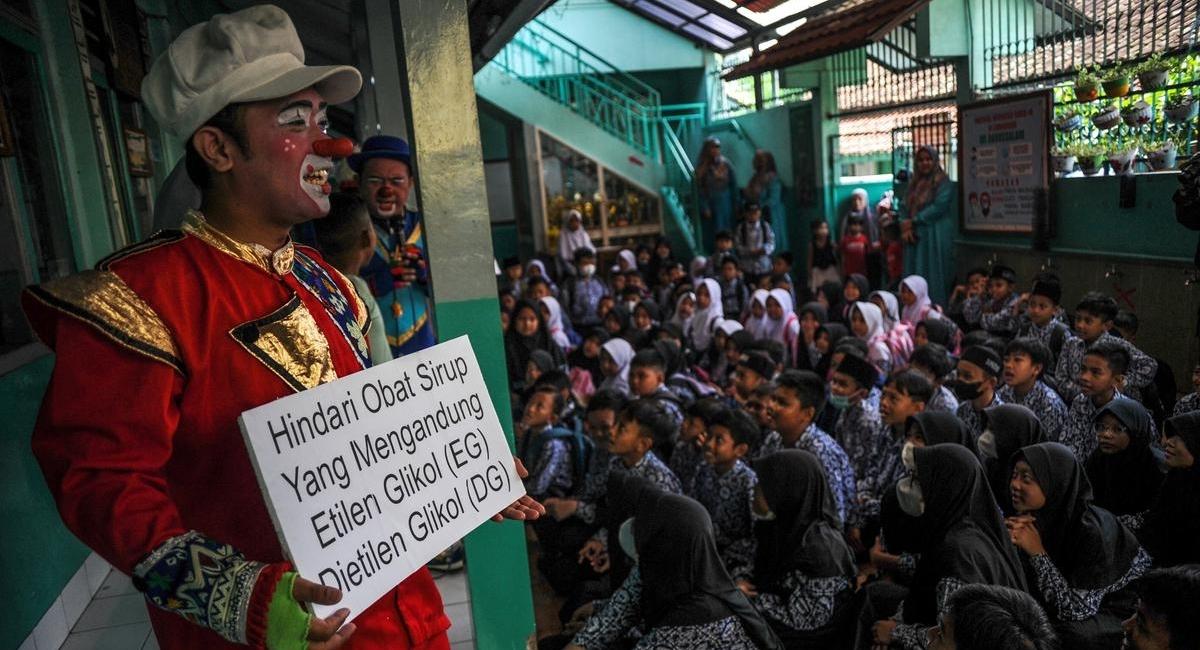
According to a report by Nikkei (a Japanese news p...
news-extra-space

 For those unaware, at least 157 children died this year in Indonesia from acute renal injury and other complications thought to have been brought on by contaminated medications. Indonesia is currently dealing with this tragic wave of mortality. Unfortunately, nearly all of them were little children.
What's more
The government later outlawed the sale of all liquid medications. After that, it restricted the prohibition to around 100 suspect products discovered in the homes of sick children. Additionally, when children need medicine, pharmacies all around the country have removed bottles from the shelf and advised parents to break the pills instead. Furthermore, the victims had evidence of the toxic chemicals ethylene glycol, diethylene glycol, and ethylene glycol butyl ether, according to Indonesia's health minister Budi Gunadi Sadikin.
Diethylene glycol and ethylene glycol are commonly used as solvents in numerous items, including cosmetics, and as antifreeze solutions for air conditioners, refrigerators, and freezers. They are never used in medications, according to the World Health Organization (WHO). The minister stated, "It is confirmed that (acute kidney injury) was caused by (those) substances."
More details
The incident occurred a few weeks after The Gambia saw the loss of close to 70 children. Four Indian-made cough syrups sold in The Gambia were discovered to have an "unacceptable level" of diethylene glycol and ethylene glycol, according to the WHO.
For those unaware, at least 157 children died this year in Indonesia from acute renal injury and other complications thought to have been brought on by contaminated medications. Indonesia is currently dealing with this tragic wave of mortality. Unfortunately, nearly all of them were little children.
What's more
The government later outlawed the sale of all liquid medications. After that, it restricted the prohibition to around 100 suspect products discovered in the homes of sick children. Additionally, when children need medicine, pharmacies all around the country have removed bottles from the shelf and advised parents to break the pills instead. Furthermore, the victims had evidence of the toxic chemicals ethylene glycol, diethylene glycol, and ethylene glycol butyl ether, according to Indonesia's health minister Budi Gunadi Sadikin.
Diethylene glycol and ethylene glycol are commonly used as solvents in numerous items, including cosmetics, and as antifreeze solutions for air conditioners, refrigerators, and freezers. They are never used in medications, according to the World Health Organization (WHO). The minister stated, "It is confirmed that (acute kidney injury) was caused by (those) substances."
More details
The incident occurred a few weeks after The Gambia saw the loss of close to 70 children. Four Indian-made cough syrups sold in The Gambia were discovered to have an "unacceptable level" of diethylene glycol and ethylene glycol, according to the WHO.
 However, no evidence exists to support a connection between the two incidents. The four syrups, according to Indian officials and the company that made them, Maiden Pharmaceuticals, were solely exported to The Gambia. Additionally, according to Indonesia, the syrups prepared in India are not sold there.
BPOM, Indonesia's food and drug ministry, announced last Monday that it will look into two pharmaceutical firms whose suppliers for some of the substances had lately shifted from pharma suppliers to chemical suppliers. According to BPOM CEO Penny Lukito, "there are indications in their products... that are highly excessive, highly toxic, and suspected to cause kidney injury."
Indonesia has requested supplies of a rare antidote called fomepizole from Singapore and Australia to treat the scores of sick children who are currently receiving treatment for acute kidney injury.
Conclusion
Nonetheless, the incident has left Indonesia in shock. The health ministry and BPOM were criticized by the nation's Ombudsman last week for not doing enough to test the products that were for sale to make sure they complied with regulations. In a furious editorial, the Jakarta Post newspaper claimed that the BPOM delegated testing authority to the pharmaceutical corporations itself, calling this revelation "terrifying" and evidence that the government had "given up its authority."
However, no evidence exists to support a connection between the two incidents. The four syrups, according to Indian officials and the company that made them, Maiden Pharmaceuticals, were solely exported to The Gambia. Additionally, according to Indonesia, the syrups prepared in India are not sold there.
BPOM, Indonesia's food and drug ministry, announced last Monday that it will look into two pharmaceutical firms whose suppliers for some of the substances had lately shifted from pharma suppliers to chemical suppliers. According to BPOM CEO Penny Lukito, "there are indications in their products... that are highly excessive, highly toxic, and suspected to cause kidney injury."
Indonesia has requested supplies of a rare antidote called fomepizole from Singapore and Australia to treat the scores of sick children who are currently receiving treatment for acute kidney injury.
Conclusion
Nonetheless, the incident has left Indonesia in shock. The health ministry and BPOM were criticized by the nation's Ombudsman last week for not doing enough to test the products that were for sale to make sure they complied with regulations. In a furious editorial, the Jakarta Post newspaper claimed that the BPOM delegated testing authority to the pharmaceutical corporations itself, calling this revelation "terrifying" and evidence that the government had "given up its authority."
 The newspaper reported, "As our hearts are wrenched as parents continue to lose the lives of their precious children, we now find gross negligence and a lack of supervision by the government."
The National University of Singapore's Prof. Eric Chan told the BBC that he was shocked to learn that murders of this nature were still happening and called the situation in Indonesia a "human calamity." In the past, he added, diethylene glycol was used to sweeten pharmaceutical flavors, but it is now known to be hazardous.
Diglycolic acid is created when diethylene glycol metabolizes in the body; this acid builds up in kidney cells, where it destroys them and, if left untreated, can be fatal. An early sign of kidney toxicity is a decrease in urine.
The newspaper reported, "As our hearts are wrenched as parents continue to lose the lives of their precious children, we now find gross negligence and a lack of supervision by the government."
The National University of Singapore's Prof. Eric Chan told the BBC that he was shocked to learn that murders of this nature were still happening and called the situation in Indonesia a "human calamity." In the past, he added, diethylene glycol was used to sweeten pharmaceutical flavors, but it is now known to be hazardous.
Diglycolic acid is created when diethylene glycol metabolizes in the body; this acid builds up in kidney cells, where it destroys them and, if left untreated, can be fatal. An early sign of kidney toxicity is a decrease in urine.
 The fact that instances had been reported throughout Indonesia, according to Prof. Chan, suggested that a pharmaceutical corporation with extensive distribution networks was responsible. He said that the fact that many of the youngsters were transferred from hospital to hospital for treatment may indicate that medical personnel in nearby hospitals are not accustomed to treating drug-induced illness.
He cautioned, "We have to keep in mind the number of deaths may still go up."
The fact that instances had been reported throughout Indonesia, according to Prof. Chan, suggested that a pharmaceutical corporation with extensive distribution networks was responsible. He said that the fact that many of the youngsters were transferred from hospital to hospital for treatment may indicate that medical personnel in nearby hospitals are not accustomed to treating drug-induced illness.
He cautioned, "We have to keep in mind the number of deaths may still go up."
Leave a Reply






